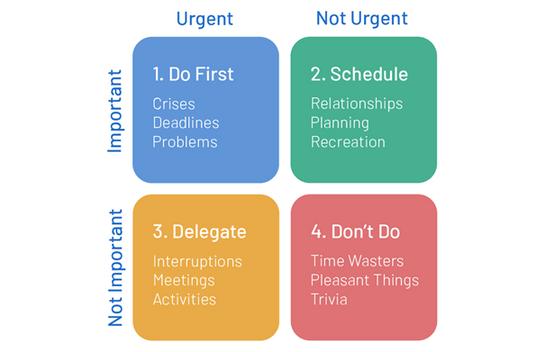4 minute read
Meet deadlines
E-module IV. Time Management Skills
MEETING DEADLINES MEANS:
For the mentor it means to ensure that the mentees complete
their work. It is easy to delay or to forget a task that has no agreed end point to complete it. Deadlines help to avoid this.
To encourage a smooth work flow. Deadlines help teams to collaborate toward achieving a shared goal and allow the leader to keep complex, multistage activities and projects on track.
To set expectations. Deadlines make clear what is expected to be delivered and when. This means that the leaders can take control of their teams work, free of confusion and misunderstanding.
For mentee meeting deadlines means punctuality that shows dedication and seriousness about ones work.
It is one of the crucial factor on which a person is judged.
Tells a lot about ones personality and self-discipline.
Even for student, deadlines work as motivating force to accomplish a task.
Deadlines can even be made by student themselves while planning their work.
E-module IV. Time management skills
MEETING DEADLINES
ACTIVITIES/TOOLS TO IMPROVE MEETING DEADLINES:
As a beginning, it is essential that both the mentee and the mentor are clear on agreed upon deadlines and expected outcomes. If one of them has the feeling that they are not on the same page, mentees should ask for clarification. This can be achieved through a conversation or by emailing to the mentor a brief outline noting mentees’ understanding of due dates and expectations and ask for confirmation.
In order to keep track of all of the projects and activities that the person is responsible for, it is useful to make a list indicating the deadlines and to keep it handy.
To make large projects more manageable, break them down into smaller pieces/steps. Have a start and finish time for each step.
It is a good idea to build a cushion into your project timeline. If unanticipated things or delays occur, a cushion will help to ensure that you are still able to meet your deadline. Additionally, you want to avoid the downfalls associated with waiting until the last minute. Procrastinating on important tasks often results in stress and lower quality work.
Be sure to regularly set aside blocks of time to work on the assignment. If possible, avoid taking calls or checking emails during this block of time. Focus all of your attention to a concrete task will enable you to make more progress and do better quality work.
If mentees negotiate an extension, they should be sure to meet their new due date.
E-module IV. Time management Skills
MEETING DEADLINES THE MAIN OBSTACLES AND CHALLENGES:
Poor organization. Organizational skills are equally essential for higher productivity in your professional and personal life. Without learning such new skills, your productivity will suffer — which may hinder your professional growth, leading to lower employee satisfaction. Additionally, there is a correlation between organizational skills and your mental and physical health. Being disorganized leads to increased stress and anxiety levels, culminating in physical symptoms like headaches and back pain.
Not setting priorities. Prioritizing tasks is vital in effectively managing your time. You can’t hope to improve your productivity with poor decision-making. A lack of prioritization is a common challenge people face and is one of the most prevalent causes of wasted time. If you are unsure of how to start your workday, you won’t be able to allocate sufficient time to its completion., Prioritization is crucial for achieving long-term goals.
Being a perfectionist. While striving for excellence is a good idea, don’t let it come at the cost of your productivity. As an employee, it’s important to remember that every new project you tackle could present a new set of obstacles to overcome. Aim to complete the project to the best of your ability, but keep in mind that you don’t have the time required to complete every task perfectly.
Not saying no. Time is the most valuable resource we have, and occasionally we simply don’t have the time to complete a task. In such situations, it’s okay to let your team know you can’t do it. If you are used to replying ‘yes’ to most things, this can seem challenging at first.
E-module IV. Time management skills
MEETING DEADLINES
Activity 1: Creating a to-do list
Creating a to-do list sounds simple enough, but if it is not used properly, it won’t be effective. Some of the key points to keep in mind include:
Only include tasks, not goals and objectives: Goals and objectives are larger aspirations that require more than a day’s work to accomplish.
Don’t put too many items on the list: This tends to have an adverse effect, making you feel like you have too much to do.
Reward yourself: Don’t forget to award yourself with something pleasant for completing tasks (take a coffee or something sweet, listen to music or favorite song, have a short chat with a colleague, go out of the office to take some fresh air and moving).




